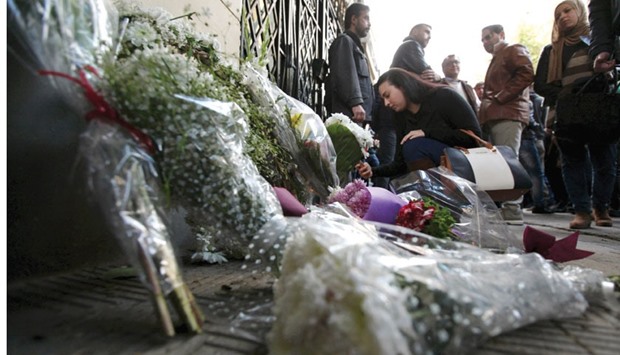
People attend a memorial for Regeni outside the Italian embassy in Cairo.
The body of a 28-year-old Italian student who had disappeared in Cairo last week and was found dead was repatriated yesterday to Italy which has launched an investigation into his death.
Giulio Regeni, a Cambridge University PhD student, had gone missing on January 25 while on his way to meet a friend.
His half-naked body which showed signs of torture was found in a roadside ditch on the outskirts of Cairo early on Wednesday.
Egypt’s public prosecutor Hossam Nassar said he had been murdered.
Italian Justice Minister Andrea Orlando was with members of Regeni’s family when his body arrived back in Rome yesterday.
“I am here to convey the government’s condolences ... but also to confirm the government’s determination to shed light quickly (on Regeni’s death) and bring those responsible to justice,” Orlando told journalists.
Italian investigators have arrived in Cairo, the Rome prosecutor has opened an inquiry and a new autopsy is scheduled.
An initial Egyptian prosecution report seen by an AFP reporter said Regeni’s body had bruises and injuries, including apparent cigarette-burn marks near the eyes and on the feet.
Italy’s ambassador to Egypt, Maurizio Massari, also reported signs of torture after a visit to the Cairo morgue.
“I saw wounds, some bruises and burns. There is no doubt that this boy had been violently beaten and tortured,” he told the Corriere della Sera newspaper.
Regeni, whose studies included Arabic and Arab literature, was from Fiumicello near Udine in northeastern Italy.
He was in Cairo doing research for his doctoral thesis on trade unions in Egypt and was last seen when he left his home with the intention of travelling by metro to meet a friend in the city centre.
Dozens of people gathered at the Italian embassy in Cairo yesterday to mourn Regeni.
A group of about 50 people including friends and Egyptian political activists gathered in front of the embassy, laying flowers and lighting candles.
“Giulio was here fighting for the rights of Egyptian workers, and for the Egyptian revolution. The least we can do is stand here and say that we consider him to be one of us,” said activist Sally Toma. “Unfortunately he died the same way Egyptians die every day.”
Il Manifesto, a left-wing newspaper based in Rome, published Regeni’s final article on Friday, describing difficulties faced by unions in Egypt under President Abdel Fattah al-Sisi.
Tensions had been high in Egypt in the run-up to the anniversary of the anti-Mubarak uprising, with police detaining activists and warning people not to demonstrate. No significant protests took place.
Rights groups say Egyptians are often detained by police on little evidence and beaten or coerced.
Scores have disappeared since 2013. Egypt denies allegations of police brutality.
Last year, Islamic State militants kidnapped a Croatian man on the outskirts of Cairo and later beheaded him, but such incidents are rare and there was a heavy police presence in downtown Cairo when Regeni went missing.
On Thursday, the Italian foreign ministry summoned the Egyptian ambassador to express concern about the student’s death, and Prime Minister Matteo Renzi telephoned Sisi, asking for a joint investigation and the swift return of Regeni’s body to Italy.
